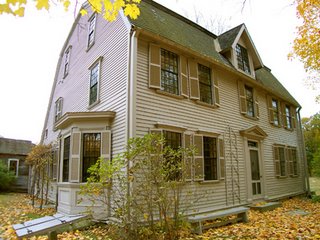Monday, October 09, 2006
Resting in Christ
One week ago I found myself standing in front of one of the most famous windows in American history. It was the window from which the William Emerson family watched the first shots being fired in the American War for Independence in 1775. Seventy years later, a young, newly married Nathaniel Hawthorne would begin his writing career at the desk that sits before the window. But it was also here, in 1836, that Ralph Waldo Emerson wrote “Nature,” an essay that would rock the literary-theological world. Emerson boldly declared, “Our age is retrospective. It builds the sepulchers of the fathers. . . . It writes biographies, histories, and criticism. . . . Let us demand our own works and laws and worship.”
Two years later, in the “Divinity School Address,” he would write,
“Jesus Christ belonged to the true race of prophets. He saw with open eye the mystery of the soul. Drawn by its severe harmony, ravished with its beauty, he lived in it, and had his being there. Alone in all history, he estimated the greatness of man. . . . The Puritans in England and America . . . their creed is passing away, and none arises in its room. I think no man can go with his thoughts about him, into one of our churches, without feeling, that what hold the public worship had on men is gone, or going. . . . In the country, neighborhoods, half parishes are signing off. It is already beginning to indicate character and religion to withdraw from the religious meetings. . . . Let me admonish you, first of all, to go alone; to refuse the good models, even those which are sacred in the imagination of men, and dare to love God without mediator or veil.”
Sound familiar? This kind of thinking is rampant in America today. Spirituality is good. No need for churches, doctrines, or sacraments. Find your flame and fan it.
Contrast this with the words of the Psalmist:
Psalm 131:1-3
A Song of Ascents, of David.
O Lord, my heart is not proud, nor my eyes haughty;
Nor do I involve myself in great matters,
Or in things too difficult for me.
[2] Surely I have composed and quieted my soul;
Like a weaned child rests against his mother,
My soul is like a weaned child within me.
[3] O Israel, hope in the Lord
From this time forth and forever.
David shows us genuine humility, happiness, and hope. He is not giving us an excuse for avoiding difficult challenges in life. He points us to the pride and presumption that undervalues other people and presumes a great deal about our own insights and opinions. His soul is like a weaned child being carried by his mother. No more fretting or fearing, only security and safety.
You remember what Jesus said, “And He called a child to Himself and set him before them, [3] and said, 'Truly I say to you, unless you are converted and become like children, you shall not enter the kingdom of heaven. [4] Whoever then humbles himself as this child, he is the greatest in the kingdom of heaven'” (Matthew 18:2-4).
At the end of the day there are only two worldviews. The worldview that begins with me and the worldview that begins with God. The worldview that asserts my self-will or the worldview that submits to God’s will. The worldview that begins by talking or the worldview that begins by listening.
As Lewis said, “There are only two kinds of people in the end: those who say to God, 'Thy will be done,' and those to whom God says, in the end, 'Thy will be done.'”
“Take My yoke upon you, and learn from Me, for I am gentle and humble in heart; and you shall find REST FOR YOUR SOULS” (Matthew 11:29). Like a weaned child resting against his mother's side; this is the rest the soul experiences when safe under Christ’s wing.
Subscribe to:
Post Comments (Atom)




2 comments:
Thanks for your continued work on this blog. It has become a part of my daily readings, and I cannot count the number of times I have been encouraged. Thanks very much for this.
Josh Manley
Washington, D.C. (Capitol Hill Baptist Church)
Thank you Josh for what you are doing in Washington. By the way, although most people couldn't say who he is, the more I read Emerson the more I realize that his continuing influence on American culture is significant.
Blessings,
Brad
Post a Comment